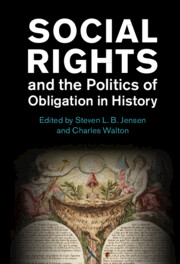Book contents
- Social Rights and the Politics of Obligation in History
- Human Rights in History
- Social Rights and the Politics of Obligation in History
- Copyright page
- Contents
- Contributors
- Acknowledgements
- 1 Not ‘Second-Generation Rights’
- Part I Religion, Markets, States
- Part II Race, Gender, Class
- Part III Social Rights in the Age of Internationalism
- 12 The Spirit of Social Rights
- 13 From Human Welfare to Human Rights
- 14 Claiming Land, Claiming Rights in Africa’s Internationally Supervised Territories
- 15 The Road from 1966
- 16 The Past and Future of Social Rights
- Index
15 - The Road from 1966
Social and Economic Rights after the International Covenant
from Part III - Social Rights in the Age of Internationalism
Published online by Cambridge University Press: 11 January 2022
- Social Rights and the Politics of Obligation in History
- Human Rights in History
- Social Rights and the Politics of Obligation in History
- Copyright page
- Contents
- Contributors
- Acknowledgements
- 1 Not ‘Second-Generation Rights’
- Part I Religion, Markets, States
- Part II Race, Gender, Class
- Part III Social Rights in the Age of Internationalism
- 12 The Spirit of Social Rights
- 13 From Human Welfare to Human Rights
- 14 Claiming Land, Claiming Rights in Africa’s Internationally Supervised Territories
- 15 The Road from 1966
- 16 The Past and Future of Social Rights
- Index
Summary
This chapter looks at the direction the debates on social and economic human rights took after the adoption of the International Covenant on Economic, Social and Cultural Rights in 1966 and until the late 1980s. The focus is on the United Nations as the debates here reflected larger political questions about the meaning and relevance of social and economic rights as obligations in the unfolding post-colonial world. With decolonisation, the former colonial powers had been ‘liberated’ from the obligations of empire while many rulers in newly independent states used the new-found sovereignty to avoid scrutiny of the broad range of human rights. Decolonisation proved to be the perfect storm for social and economic rights denial. This would be further entrenched by expanding neo-liberal reforms and debt management leading to the ‘lost decade’ for development during the 1980s. Despite social and economic rights being continually neglected, the chapter argues that they always remained central to the problem of human rights.
Keywords
- Type
- Chapter
- Information
- Social Rights and the Politics of Obligation in History , pp. 287 - 307Publisher: Cambridge University PressPrint publication year: 2022

